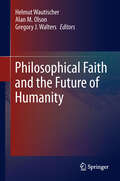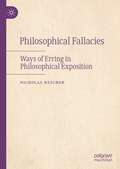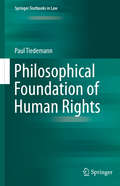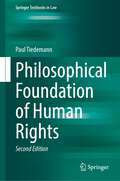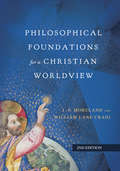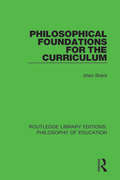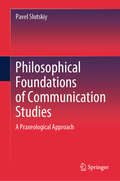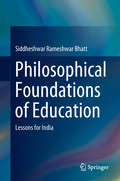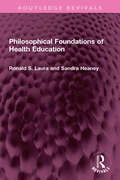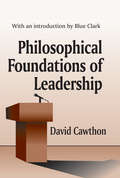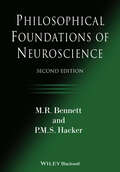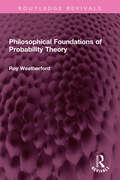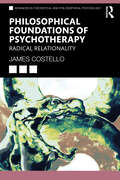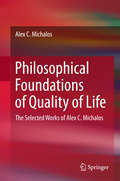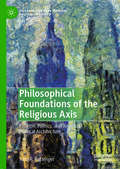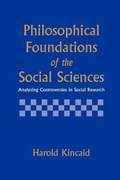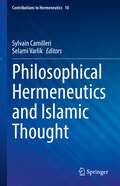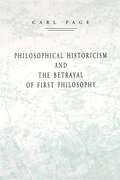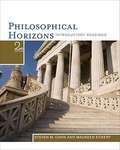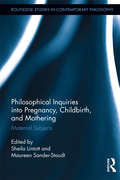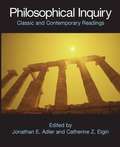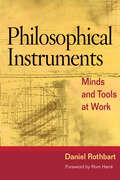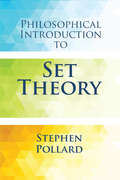- Table View
- List View
Philosophical Faith and the Future of Humanity
by Helmut Wautischer Alan M. Olson Gregory J. WaltersKarl Jaspers, who died in 1969, had a profound impact on 20th-century theology and philosophy. His central thesis called for, among other things, a de-centering of philosophy from its Eurocentric roots and a renewal of its dialogue with other traditions, especially Asian ones. This collection of essays includes unpublished work by Jaspers himself as well as testimonies to his life and career by colleagues, associates, and translators, some of who knew Jaspers personally. Readers will also find commentary and interpretation by researchers who have explored Jaspers' work for decades, and a biographical account of Jaspers' student Leonard Ehrlich, who handled much of Jaspers' English translation. The book interrogates Jaspers' conceptions of 'philosophical faith', his philosophy of communication, and the prospects for world philosophy in the future. Focusing on philosophical faith, it assesses Jaspers' interpretations of key philosophers such as Kant, Hegel, Schelling, Kierkegaard, Nietzsche, and Rosenzweig, as well as examining his personal relationships with Bultmann and Heidegger. Contributors also look at Jaspers' philosophies of religion and history, his hypothesis of the 'axial age' (Achsenzeit), and his contributions to metaphysics, periechontology, and economics. Finally, chapters cover Jaspers' philosophy of communication and world history. The latter are informed by a burgeoning interest in Kantian 'Freiheitphilosophie' that influenced Jaspers, as well as concerns over the future of humanity. These concerns in part account for Jaspers' growing popularity in the Middle East, Eastern Europe, Central/South America, and Asia. Also included are lucid clarifications of the difference between religious and philosophical faith, and the relevance of certainty, trust, and communication for a future of mankind. Trained as a psychiatrist, Jaspers practiced this profession before becoming a philosopher and thus had a keen insight into the workings of the human mind even as he challenged the philosophical establishment of his time. It is perhaps this depth to his background that adds to the contemporary relevance of his work.
Philosophical Fallacies: Ways of Erring in Philosophical Exposition
by Nicholas RescherThis book examines the nature, sources, and implications of fallacies in philosophical reasoning. In doing so, it illustrates and evaluates various historical instances of this phenomenon. There is widespread interest in the practice and products of philosophizing, yet the important issue of fallacious reasoning in these matters has been effectively untouched. Nicholas Rescher fills this gap by presenting a systematic account of the principal ways in which philosophizing can go astray.
Philosophical Foundation of Human Rights (Springer Textbooks in Law)
by Paul TiedemannThis textbook presents a range of classical philosophical approaches in order to show that they are unsuitable as a foundation for human rights. Only the conception of human dignity –based on the Kantian distinction between price and dignity – can provide a sufficient basis. The derivation of human rights from the principle of human dignity allows us to identify the most crucial characteristic of human rights, namely the protection of personhood. This in turn makes it possible (1) to distinguish between real moral human rights and spurious ones, (2) to assess the scope of protection for many codified human rights according to the criteria of “core” and “yard,” and (3) offers a point of departure for creating new, unwritten human rights. This philosophical basis supports a substantial reassessment of the case law on human rights, which will ultimately allow us to improve it with regard to legal certainty, clarity and cogency.The textbook is primarily intended for advanced law students who are interested in a deeper understanding of human rights. It is also suitable for humanities students, and for anyone in the political or social arena whose work involves human rights and their enforcement.Each chapter is divided into four parts: Abstracts, Lecture, Recommended Reading, and Questions to check reader comprehension. Sample answers are included at the end of the book.
Philosophical Foundation of Human Rights (Springer Textbooks in Law)
by Paul TiedemannThis textbook presents a range of classical philosophical approaches in order to show that they are unsuitable as a foundation for human rights. Only the conception of human dignity –based on the Kantian distinction between price and dignity – can provide a sufficient basis. The derivation of human rights from the principle of human dignity allows us to identify the most crucial characteristic of human rights, namely the protection of personhood. This in turn makes it possible (1) to distinguish between real moral human rights and spurious ones, (2) to assess the scope of protection for many codified human rights according to the criteria of “core” and “yard,” and (3) offers a point of departure for creating new, unwritten human rights. This philosophical basis supports a substantial reassessment of the case law on human rights, which will ultimately allow us to improve it with regard to legal certainty, clarity and cogency.In the second edition, errors have been corrected in numerous places, the text has been made clearer and easier to understand. In addition, more recent human rights issues have been newly included, especially those related to the Corona epidemic and climate change. The textbook is primarily intended for advanced law students who are interested in a deeper understanding of human rights. It is also suitable for humanities students, and for anyone in the political or social arena whose work involves human rights and their enforcement.Each chapter is divided into four parts: Abstracts, Lecture, Recommended Reading, and Questions to check reader comprehension. Sample answers are included at the end of the book.
Philosophical Foundations for a Christian Worldview
by J. P. Moreland William Lane CraigNow updated and expanded in this second edition, Philosophical Foundations for a Christian Worldview by J. P. Moreland and William Lane Craig offers a comprehensive introduction to philosophy from a Christian perspective. In their broad sweep they seek to introduce readers to the principal subdisciplines of philosophy, including epistemology, metaphysics, philosophy of science, ethics, and philosophy of religion. They do so with characteristic clarity and incisiveness. Arguments are clearly outlined, and rival theories are presented with fairness and accuracy. Philosophy, they contend, aids Christians in the tasks of apologetics, polemics, and systematic theology. It reflects our having been made in the image of God, helps us to extend biblical teaching into areas not expressly addressed in Scripture, facilitates the spiritual discipline of study, enhances the boldness and self-image of the Christian community, and is requisite to the essential task of integrating faith and learning. Here is a lively and thorough introduction to philosophy for all who want to know reality. This second edition now includes including enhanced arguments, updated bibliographies, and new chapters on atonement and the mind-body problem.
Philosophical Foundations for the Curriculum (Routledge Library Editions: Philosophy of Education #3)
by Allen BrentIn this book, first published in 1978, Allen Brent sets out to explore some of the questions raised by theorists and philosophers regarding curriculum. He starts by investigating whether all knowledge is the product of social conditions of particular times or places, or whether there is some kind of universal framework implicit in the claims to knowledge which men make. He looks at the work of Plato, Newman, Freire and Hirt and how, each of them in a strikingly different way, they have tried to give us an objective basis for curriculum judgements and how the validity of that basis is attacked by contemporary sociologists of knowledge. This book is aimed primarily at students who are concentrating on the philosophy of education or curriculum theory.
Philosophical Foundations of Communication Studies: A Praxeological Approach
by Pavel SlutskiyThis book explores the philosophical foundations of communication studies, suggesting that communication phenomena extend beyond the scope of traditional scientific methods. It argues that communication, deeply intertwined with human behavior, cannot be fully comprehended through empirical methods alone. The book presents an epistemological alternative to empiricism in communication studies—an alternative rooted in the praxeological perspective. Drawing from the principles of rationalism, it proposes that conclusions about communication can be deduced from a priori theoretical truths, rather than empirical evidence. This book is a crucial resource for scholars in both philosophy and communication studies.
Philosophical Foundations of Education: Lessons for India
by Siddheshwar Rameshwar BhattThis book provides a philosophical foundation to the theory and practice of education from the Indian perspective. It is guided by an 'axionoetic' approach to education and therefore it deals with the epistemological foundation and value orientation of education. The author discusses the ontological, epistemological, logical, ethical and axiological bases of education in a holistic and integrated manner. The author maintains that education is a planned, methodical and purposive enhancement of human potentialities as a natural development. This presupposes correct and adequate formulation of the objectives and goals of education as per the needs and aspirations of pupils. Education also equips individuals for a good quality of life. Keeping in view the applied dimension of philosophy, this book analyses practical issues of moral education like character building value-negativism in the context of education. It also deals with issues concerning peace, sustainable development, sustainable judicious consumption etc. which should have a bearing on educational policies and programmes.
Philosophical Foundations of Health Education (Routledge Revivals)
by Ronald S. Laura Sandra HeaneyFirst published in 1990 Philosophical Foundations of Health Education analyses the dogmatism of conventional medicine as a form of scientism and tries to determine the extent to which the state of health education has been perverted by an uncritical acceptance of these dogmas. It discusses themes like the genesis of reductionist medical science; scientism in medicine and the crisis in health care; integrating the philosophical foundations of holistic health education; holistic understanding of health and disease; evolution of primary health care; the demystification of medicine; and conscientization and health for all, to suggest that holism is an integral part of the philosophy of health which allows personal and societal needs to be realized in a global context. This book is a must read for students and scholars of philosophy of medicine, medical sociology, and philosophy of education.
Philosophical Foundations of Leadership
by David CawthornThe nature of leadership and the human qualities that promote or inhibit it have a long history in Western thought and remain a central concern in modern societies. Crises in leadership may arise from either human failings or social complexities that defeat or reject those most qualified to lead. While most contemporary political or social commentators on such crises tend to focus on external circumstances, David Cawthon examines classical thinkers from Plato to Nietzsche to offer a historical and philosophical perspective on the intrinsic qualities of leadership and how these qualities are coded into the souls of some, but not of others.
Philosophical Foundations of Neuroscience
by P. M. Hacker M. R. BennettThe second edition of the seminal work in the field—revised, updated, and extended In Philosophical Foundations of Neuroscience, M.R. Bennett and P.M.S. Hacker outline and address the conceptual confusions encountered in various neuroscientific and psychological theories. The result of a collaboration between an esteemed philosopher and a distinguished neuroscientist, this remarkable volume presents an interdisciplinary critique of many of the neuroscientific and psychological foundations of modern cognitive neuroscience. The authors point out conceptual entanglements in a broad range of major neuroscientific and psychological theories—including those of such neuroscientists as Blakemore, Crick, Damasio, Dehaene, Edelman, Gazzaniga, Kandel, Kosslyn, LeDoux, Libet, Penrose, Posner, Raichle and Tononi, as well as psychologists such as Baar, Frith, Glynn, Gregory, William James, Weiskrantz, and biologists such as Dawkins, Humphreys, and Young. Confusions arising from the work of philosophers such as Dennett, Chalmers, Churchland, Nagel and Searle are subjected to detailed criticism. These criticisms are complemented by constructive analyses of the major cognitive, cogitative, emotional and volitional attributes that lie at the heart of cognitive neuroscientific research. Now in its second edition, this groundbreaking work has been exhaustively revised and updated to address current issues and critiques. New discussions offer insight into functional magnetic resonance imaging (fMRI), the notions of information and representation, conflict monitoring and the executive, minimal states of consciousness, integrated information theory and global workspace theory. The authors also reply to criticisms of the fundamental arguments posed in the first edition, defending their conclusions regarding mereological fallacy, the necessity of distinguishing between empirical and conceptual questions, the mind-body problem, and more. Essential as both a comprehensive reference work and as an up-to-date critical review of cognitive neuroscience, this landmark volume: Provides a scientifically and philosophically informed survey of the conceptual problems in a wide variety of neuroscientific theories Offers a clear and accessible presentation of the subject, minimizing the use of complex philosophical and scientific jargon Discusses how the ways the brain relates to the mind affect the intelligibility of neuroscientific research Includes fresh insights on mind-body and mind-brain relations, and on the relation between the notion of person and human being Features more than 100 new pages and a wealth of additional diagrams, charts, and tables Continuing to challenge and educate readers like no other book on the subject, the second edition of Philosophical Foundations of Neuroscience is required reading not only for neuroscientists, psychologists, and philosophers, but also for academics, researchers, and students involved in the study of the mind and consciousness.
Philosophical Foundations of Probability Theory (Routledge Revivals)
by Roy WeatherfordFirst published in 1982, Philosophical Foundations of Probability Theory starts with the uses we make of the concept in everyday life and then examines the rival theories that seek to account for these applications. It offers a critical exposition of the major philosophical theories of probability, with special attention given to the metaphysical and epistemological assumptions and implications of each. The Classical Theory suggests probability is simply the ratio of favorable cases to all equi-possible cases: it is this theory that is relied on by gamblers and by most non-specialists. The A Priori Theory, on the other hand, describes probability as a logical relation between statements based on evidence. The Relative Frequency theories locate it not in logic but among empirical rates of occurrence in the real world, while the Subjectivist Theory identifies probability with the degree of a person’s belief in a proposition. Each of these types of theory is examined in turn, and the treatment is unified by the use of running examples and parallel analyses of each theory. The final chapter includes a summary and the author’s conclusions. This book is an essential read for scholars and researchers of Philosophy.
Philosophical Foundations of Psychotherapy: Radical Relationality (Advances in Theoretical and Philosophical Psychology)
by James CostelloPhilosophical Foundations of Psychotherapy promotes a critical understanding of the ideas, traditions, values, and principles that inform and shape – for better or for worse – what therapists do.The book challenges the unhelpful misconception that philosophy is for philosophers alone, because human reality is too complex for therapists to be unaware of the foundations, difficulties, and contradictions within our value systems, ethics, and assumptions. By retrieving attitudes from other times and other places, traversing the relational contours of history right up to contemporary thinkers and practitioners, the author argues that not only do relationships heal, but they offer the only safe harbour in life’s sea of troubles. He promotes a conscientious radical relationality, which remains attentive to its influences, including contemporary debates about our neoliberal selves, the superstructures of culture, and the ethics of authenticity. In stepping back from the sometimes- narrow concerns of our therapeutic methods, the book explores broader themes important for living well: what is the good of therapy, how do we reconcile our sense of futility in the face of an indifferent universe, postcolonial debates, responses to disembodied artificial intelligence, and alternatives to our human- centred stance towards Nature.This book is primarily for practitioners, trainees, and educators, but ultimately it is intended for the greater good of clients and those interested in what therapeutic practices and practitioners have to offer. It will also be useful for those teaching research methods, the practice of research supervision, reflexivity, and personal development, across all areas related to mental health.
Philosophical Foundations of Quality of Life
by Alex C. MichalosThis first volume has as its main focus the philosophical foundations of Michalos' work and describes it in the broad context of the study of logic, the philosophy of social sciences, and a general theory of value. After distinguishing things that have value from the value that things might have, it describes the foundations of a pragmatic theory of value. This theory plays a key role in the author's research on the quality of life and connects his empirical research to the philosophical tradition of the American pragmatists William James, Ralph Barton Perry, John Dewey and Clarence Irving Lewis. The volume addresses various aspects and issues concerning decision making, including decision procedures used in committees, used for assessing the acceptability of scientific theories and new technologies, procedures for a science court, ethical issues involved in the formation of beliefs, some limitations of classical economists' alleged postulates of rational preference, and the importance of analytic guides to decision making. Finally, it describes the organization of the Social Sciences Federation of Canada and a formal accounting system for scientific research.
Philosophical Foundations of the Religious Axis: Religion, Politics, and American Political Architecture (Palgrave Studies in Religion, Politics, and Policy)
by John R. PottengerThis book discusses the evolution of three philosophical foundations from the twelfth through the eighteenth centuries that converged to form the basis of liberal democracy’s approach to the place and role of religion in society and politics. Identified by the author as a “religious axis,” the period of convergence promoted rational and empirical investigation, enabled the development of diverse religious beliefs, and affirmed religious liberty and expressions amidst pluralist politics. The author shows that the religious axis’ three philosophical foundations—epistemic, axiological, and political—undergird the political architecture of American liberal democracy that designed a containment structure to protect a vast array of religious expressions and encourage their presence in the public square. Moreover, the structure embodied a democratic ethos that drives religious and political pluralism—but within limits. The author argues that this containment structure has paradoxically ignited frenzied fires of faith that politically threaten the structure’s own limits.
Philosophical Foundations of the Social Sciences
by Harold KincaidThis book defends the prospects for a science of society. It argues that behind the diverse methods of the natural sciences lies a common core of scientific rationality that the social sciences can and sometimes do achieve. It also argues that good social science must be in part about large-scale social structures and processes and thus that methodological individualism is misguided. These theses are supported by a detailed discussion of actual social research, including theories of agrarian revolution, organizational ecology, social theories of depression, and supply-demand explanations in economics.
Philosophical Hermeneutics and Islamic Thought (Contributions to Hermeneutics #10)
by Sylvain Camilleri Selami VarlikThis book investigates the methodological issues raised by the encounter between Islamic thought and contemporary philosophical hermeneutics. It features essays that examine why and how current Muslim thinkers refer to Continental philosophy. The contributors put the universality of the hermeneutic order to the test with three different approaches. The first looks at exegetical aspects. It addresses contemporary thinkers from the Islamicate world who have engaged critically or not with main representatives or key concepts of philosophical hermeneutics. The second presents an interpretative analysis. The essays here present attempts at using philosophical hermeneutics in order to develop new interpretations of canonical or traditional ensembles of texts such as the Qur’an and the Hadith as well as legal, spiritual, and philosophical corpuses from the Islamicate world. The third looks at different political and critical issues. The clear and sound reference to religion of Islamic thought makes its entanglement with philosophical hermeneutics a burning challenge for all parties involved. Is it true, as some contend, that philosophical hermeneutics can help interpret Islamic thought anew? This book reveals how the two philosophies are likely to expand each other’s horizons and influence each other’s conceptual frameworks. It features revised papers from an International Conference.
Philosophical Historicism and the Betrayal of First Philosophy
by Carl PageThe recent emergence, among philosophers, of the view that the activity of human reason in all its possible modes must also be historicized, including the activity of philosophizing itself, may be found in writers as diverse as Hans-Georg Gadamer, Richard Rorty, Michel Foucault, and Alasdair MacIntyre. This contemporary view of human reason contrasts with the traditional commitments of "First Philosophy," Aristotle's name for the knowledge of things through their ultimate causes and principles. This book challenges the prevailing historicist orthodoxies about the nature of reason and philosophy and offers the first comprehensive analysis and critique of historicism in its current philosophical form. Can philosophical historicism reasonably justify the interpretation of human reason on which its own objections to First Philosophy are based? While Carl Page ultimately concludes that it cannot, he also seeks to rehabilitate historicism's motivating insights by showing how they derive from questions Hegel and Heidegger raised about reason's relation to history.
Philosophical Historicism and the Betrayal of First Philosophy (G - Reference, Information and Interdisciplinary Subjects)
by Carl PageThe recent emergence, among philosophers, of the view that the activity of human reason in all its possible modes must also be historicized, including the activity of philosophizing itself, may be found in writers as diverse as Hans-Georg Gadamer, Richard Rorty, Michel Foucault, and Alasdair MacIntyre. This contemporary view of human reason contrasts with the traditional commitments of "First Philosophy," Aristotle's name for the knowledge of things through their ultimate causes and principles. This book challenges the prevailing historicist orthodoxies about the nature of reason and philosophy and offers the first comprehensive analysis and critique of historicism in its current philosophical form. Can philosophical historicism reasonably justify the interpretation of human reason on which its own objections to First Philosophy are based? While Carl Page ultimately concludes that it cannot, he also seeks to rehabilitate historicism's motivating insights by showing how they derive from questions Hegel and Heidegger raised about reason's relation to history.
Philosophical Horizons: Introductory Readings
by Steven M. Cahn Maureen EckertExplores the central issues of philosophy through an engaging combination of classic and contemporary sources. With over seventy non-technical readings, the editors of PHILOSOPHICAL HORIZONS have put together the easiest to follow and yet most informative philosophy selections ever. Unlike any other introductory anthology, you can read fully annotated masterpieces from the history of philosophy in their entirety, including Plato's Euthyphro, Apology, and Crito, the Encheiridion of Epictetus, Descartes's Meditations, Berkeley's Treatise, Hume's An Enquiry Concerning Human Understanding and Dialogues Concerning Natural Religion, Kant's Groundwork, Mill's Utilitarianism, James's The Will to Believe, and Sartre's The Humanism of Existentialism. These are juxtaposed with related work from contemporary philosophers so that you can experience how the issues raised in these classic works of philosophy are debated in contemporary times.
Philosophical Imagination and Cultural Memory: Appropriating Historical Traditions
by Patricia CookDoes philosophy have a future? Postmodern thought, with its rejection of claims to absolute truth or moral objectivity, would seem to put the philosophical enterprise in jeopardy. In this volume some of today's most influential thinkers face the question of philosophy's future and find an answer in its past. Their efforts show how historical traditions are currently being appropriated by philosophy, how some of the most provocative questions confronted by philosophers are given their impetus and direction by cultural memory.Unlike analytic philosophy, a discipline supposedly liberated from any manifestation of cultural memory, the movement represented by these essays demonstrates how the inquiries, narratives, traditions, and events of our cultural past can mediate some of the most interesting exercises of the present-day philosophical imagination. Attesting to the power of historical tradition to enhance and redirect the prospects of philosophy these essays exemplify a new mode of doing philosophy. The product of a National Endowment for the Humanities Summer Institute in 1990, it is the task of this book to show that history can be reclaimed by philosophy and resurrected in postmodernity.Contributors. George Allan, Eva T. H. Brann, Arthur C. Danto, Lynn S. Joy, George L. Kline, George R. Lucas, Jr., Alasdair MacIntyre, Robert C. Neville, John Rickard, Stanley Rosen, J. B. Scheenwind, Donald Phillip Verene
Philosophical Inquiries into Pregnancy, Childbirth, and Mothering: Maternal Subjects (Routledge Studies in Contemporary Philosophy)
by Sheila Lintott Maureen Sander–StaudtPhilosophical inquiry into pregnancy, childbirth, and mothering is a growing area of interest to academic philosophers. This volume brings together a diverse group of philosophers to speak about topics in this reemerging area of philosophical inquiry, taking up new themes, such as maternal aesthetics, and pursuing old ones in new ways, such as investigating stepmothering as it might inform and ground an ethics of care. The theoretical foci of the book include feminist, existential, ethical, aesthetic, phenomenological, social and political theories. These perspectives are then employed to consider many dimensions of pregnancy, childbirth, and mothering, which are of central importance to human existence, but are only rarely discussed in philosophical cannons. Topics include pregnancy and embodiment, breast-feeding, representations – or the lack thereof – of pregnant and birthing women, adoption, and post-partum motherhood.
Philosophical Inquiry: Classic and Contemporary Readings
by Jonathan E. Adler Catherine Z. ElginThis meticulously edited anthology provides a comprehensive, problems-oriented entree to philosophy. Substantial readings from major classical and contemporary thinkers--featuring many of Hackett's widely acclaimed translations--are supported by a general introduction, engaging introductions to each major topic, and a glossary of important philosophical terms.
Philosophical Instruments: Minds and Tools at Work
by Daniel RothbartThe surprising roles of instruments and experimentation in acquiring knowledge In Philosophical Instruments Daniel Rothbart argues that our tools are not just neutral intermediaries between humans and the natural world, but are devices that demand new ideas about reality. Just as a hunter's new spear can change their knowledge of the environment, so can the development of modern scientific equipment alter our view of the world. Working at the intersections of science, technology, and philosophy, Rothbart examines the revolution in knowledge brought on by recent advances in scientific instruments. Full of examples from historical and contemporary science, including electron scanning microscopes, sixteenth-century philosophical instruments, and diffraction devices used by biochemical researchers, Rothbart explores the ways in which instrumentation advances a philosophical stance about an instrument's power, an experimenter's skills, and a specimen's properties. Through a close reading of engineering of instruments, he introduces a philosophy from (rather than of) design, contending that philosophical ideas are channeled from design plans to models and from model into the use of the devices.
Philosophical Introduction to Set Theory (Dover Books on Mathematics)
by Stephen PollardThe primary mechanism for ideological and theoretical unification in modern mathematics, set theory forms an essential element of any comprehensive treatment of the philosophy of mathematics. This unique approach to set theory offers a technically informed discussion that covers a variety of philosophical issues. Rather than focusing on intuitionist and constructive alternatives to the Cantorian/Zermelian tradition, the author examines the two most important aspects of the current philosophy of mathematics, mathematical structuralism and mathematical applications of plural reference and plural quantification.Clearly written and frequently cited in the mathematical literature, this book is geared toward advanced undergraduates and graduate students of mathematics with some aptitude for mathematical reasoning and prior exposure to symbolic logic. Suitable as a source of supplementary readings in a course on set theory, it also functions as a primary text in a course on the philosophy of mathematics.
